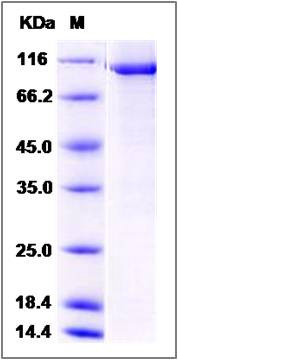Human PFK1 / PFKM Protein (His & GST Tag)
ATP-PFK,GSD7,PFK-1,PFK1,PFKA,PFKX,PPP1R122
- 100ug (NPP2397) Please inquiry
| Catalog Number | P14133-H20B |
|---|---|
| Organism Species | Human |
| Host | Baculovirus-Insect Cells |
| Synonyms | ATP-PFK,GSD7,PFK-1,PFK1,PFKA,PFKX,PPP1R122 |
| Molecular Weight | The recombinant human PFKM /GST chimera consists of 1016 amino acids and has a calculated molecular mass of 112.9 kDa. The recombinant protein migrates as an approximately 113 kDa band in SDS-PAGE under reducing conditions. |
| predicted N | Met |
| SDS-PAGE |  |
| Purity | > 90 % as determined by SDS-PAGE |
| Protein Construction | A DNA sequence encoding the human PFKM (P08237-1) (Thr2-Val780) was fused with the N-terminal polyhistidine-tagged GST tag at the N-terminus. |
| Bio-activity | Kinase activity untested |
| Research Area | Cancer |Signal transduction |Metabolism |Pathways and Processes |Metabolic signaling pathways |Carbohydrate metabolism | |
| Formulation | Supplied as sterile 20mM Tris, 500mM NaCl, pH 8.5, 10% glycerol 1. Normally 5 % - 8 % trehalose and mannitol are added as protectants before lyophilization. Specific concentrations are included in the hardcopy of COA. |
| Background | PFK1, also known as PFKM, is a regulatory glycolytic enzyme. PFK1 converts fructose 6-phosphate and ATP into fructose 1,6-bisphosphate (through PFK-1), fructose 2,6-bisphosphate (through PFK-2) and ADP. It is a muscle-type isozyme. There are three phosphofructokinase isozymes in humans: muscle, liver and platelet. These isozymes function as subunits of the mammalian tetramer phosphofructokinase, which catalyzes the phosphorylation of fructose-6-phosphate to fructose-1,6-bisphosphate. Mutations in PFK1 gene have been related with glycogen storage disease type VII, also identified as Tarui disease. |
| Reference |
